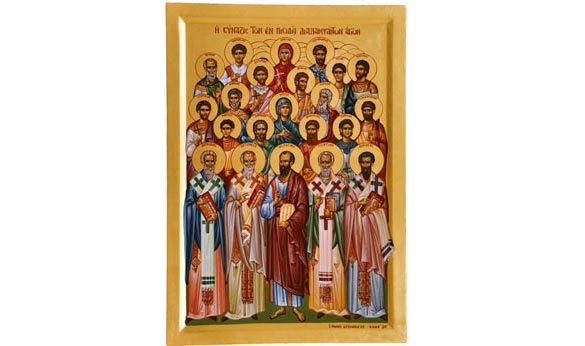
We stand strong in the presence of these thousands of Saints of our local Church of Pisidia, Side, and Antalya, the Synaxsis (ecclesiastical gathering) that we celebrate today. Among them are 18 hierarchs, known to us by name, who served as shepherds of our Church here during the 5th century, and took part in the Fourth Ecumenical Council. This Council, convened in Chalcedon in 451 and involving hundreds of other Holy Fathers, is also commemorated today. Along with them, we celebrate the memory of all the Saints of Pisidia and Pamphylia who, like bright clouds, shine in the sky. Of course, each one has their own feast day, which is celebrated throughout the Church year, but the Ecumenical Patriarchate also decided to establish this common feast for all of our local Saints, who lived from the time of the Apostles to the 19th century.
The places of their martyrdom are numerous, with the Synaxarion mentioning Antioch of Pisidia (today’s Yalvac), Sparta (today’s Isparta), Seleucia of Pisidia, Sozopolis (todays Uluborlu), Antalya, Magydo (today’s Lara), Perge, Serge, Side and other areas of Pisidia which are included in the modern Province of Pisidia. The ground of this land has been consecrated by the precious blood of the Holy Martyrs, and the tears of our Blessed Fathers. The Saints themselves are also numerous, in the many thousands. On July 16th alone, we commemorate 15,000 Holy Martyrs who lived and died in Pisidia. Only 64 of our Saints of Pisidia are known to us by name. They include Apostles, such as St. Paul and St. Barnabas, who were the first to preach the Gospel in our area during their First Apostolic Journey. We also have Aquila and Priscilla, who died as martyrs in Selge; and bishops, like St. Artemas of Pisidian Seleucia (ordained by St. Paul). This is not counting the additional priests, martyrs and holy men who can also be included. Some of those who suffered martyrdom for Christ together were friends, relatives, and even members of the same household. Saints like Hesperus and Zoe, a married couple who were martyred with their children, Kyriakos and Theodoulos, in Antalya in the year 124. There were people of every age, including those who were very young like St. Marina, who was martyred at the age of 15 in Pisidian Antioch.
What all of these Saints have in common is their love and devotion to our Lord, Jesus Christ. From the moment of their Baptism, they were united with Christ and as members of His Church, entrusted their lives to Him completely. They conformed their will to His, and sought to follow St. Paul in having “the mind of Christ” (1st Corinthians 2:16). The Holy Apostle also writes: “Brethren, whatever is true, noble, just, pure, lovely, good, whatever has to do with virtue and is praiseworthy, these you should have in your mind and these you should do” (Philippians 4: 8-9). Inspired by these words, these Saints freely worked to obediently do the will of Christ in everything. Most of them did so in times of harsh persecution. Whether it was the Roman emperors during the first three centuries of Christianity, heretics, or rulers with other religions, Christians faced arrest and public scrutiny. It was at this time that they were pressured to deny Christ, and offer sacrifice to the idols (or in later times to deny their Orthodox faith and embrace another religion). A decision had to be made in that terrible moment, so what did our Saints do? The words of St. Paul again give us an answer: “Who shall separate us from the love of Christ? Shall tribulation, or distress, or persecution, or famine, or nakedness, or peril, or sword? … We are accounted as sheep for the slaughter. Yet in all these things we are more than conquerors through Him who loved us” (Romans 8: 35-37). Determined to remain faithful to Christ, Who sacrificed Himself out of love for us, the Saints bravely faced their martyrdom in peace. In finishing the struggle, they received the bright crown of Sanctity from the Lord, with heavenly glory. That is what this feast today is all about. We celebrate their struggle to remain faithful to Christ, and honor their sacrifices and martyrdom. As we learn about their saintly lives, an even greater task for us is to follow their example in becoming imitators of Christ, as St. Paul urges us to do: “Imitate me, just as I also imitate Christ” (1st Corinthians 11:1).
We are not facing such persecutions in the country we live today, for which we give thanks to God. We are free to go to our churches and worship the true God. Even so, there are still temptations that may come and try to lead us away from the Church. Temptations that can hinder our love for Christ and turn us to worldly pleasures, living as people “without God in the world” (Ephesians 2:12). This loss of faith is a spiritual danger that has always existed. This is why, my brothers and sisters, we must keep our focus on the Saints. Let us be guided by their example, increasing our love and faith in Christ, the Savior. In so doing, we can join them in becoming worth to enter the joy of the heavenly Kingdom.





